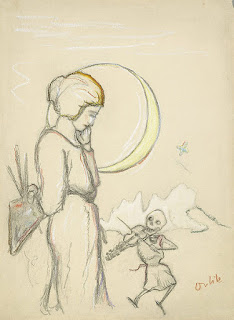Saturday 3 November 2012
Friday 2 November 2012
simulacra, simulcast or a night at the opera
The Bavarian State Opera is offering this season, with an aim to expand its audience and nestle culture comfortably on the sofa, by premiering a live-feed and streaming video on the internet of its stage performances. This outreach initiative is at no cost for any viewer who cares to watch, unlike some other houses that charge a subscription fee, and quite a bit of enhanced production value is going into the making, with dozens of cameras and microphones and back-stage tours and interviews with the performers during intermission. Anything that one can assay alone and with divided attention of course does match the experience of the commitment and being part of an audience corralled as a fourth wall, but I think the efforts are laudable in themselves and will garner a good return for the stake and investment, and I plan to play along at home.
Although this installation is not part of the historic opera house in Munich but the State Opera of Saxony in Dresden, I thought it was a comical touch to put one of the world’s first “digital” clocks (with Roman numerals that scrolled by the minutes and hours) above the stage—I suppose so patrons could be discrete about wondering when the show would end, without having to dig out their pocket-watches. I do think it’s important that it be live, however, and an occasion for dressing-up—even if one is only going as far as the living-room. Opera was never meant to be elitist and inaccessible and was traditionally quite the opposite, but I think now people shy away from the commitment of time and would rather call it so. What do you think? Is this offering expanding the audience, like a pay-per-view match or post-game camaraderie, or is it like putting church on television and only mildly engaging?
Although this installation is not part of the historic opera house in Munich but the State Opera of Saxony in Dresden, I thought it was a comical touch to put one of the world’s first “digital” clocks (with Roman numerals that scrolled by the minutes and hours) above the stage—I suppose so patrons could be discrete about wondering when the show would end, without having to dig out their pocket-watches. I do think it’s important that it be live, however, and an occasion for dressing-up—even if one is only going as far as the living-room. Opera was never meant to be elitist and inaccessible and was traditionally quite the opposite, but I think now people shy away from the commitment of time and would rather call it so. What do you think? Is this offering expanding the audience, like a pay-per-view match or post-game camaraderie, or is it like putting church on television and only mildly engaging?
Thursday 1 November 2012
castor fieber
Decades after the extinction of the wild population and subsequent reintroduction programmes in the 1950s, the beaver is making a come-back in Switzerland. Its successful return, however, is being threatened by the same human encroachment that probably caused the animal to die out in the first place: Swiss terrain and the roadways that crisscross it creates sanctuaries, albeit isolated ones, and beavers colonies do not get to sample much genetic diversity due to traffic.
 To maintain and promote healthy populations, there should be congress between members on both sides of the Rhône. Animal advocates in the Geneva (Genf) region were hoping to make drivers more cautious and aware of the beavers’ plight and need for an increased range through new signage. The government of the capital of the confederation in Bern, however, did not appreciate this unsanctioned effort—though vetted by the canton. By law, the only official animal crossing traffic sign features a deer in a warning triangle—regardless of what might creep, fly or gallop into the road—boars, wolves, foxes, hedgehogs, bears, etc. I thought that reasoning was a little unfair and obtuse at first, but then I realized probably the same restriction is in effect in Germany, since thinking about it, I’ve never seen anything besides a leaping deer warning, except for farm animals and for frogs on the march. Maybe the government will change its mind and allow their signs, and regardless, the group and the beavers probably got more attention out of the controversy than had they just been left alone.
To maintain and promote healthy populations, there should be congress between members on both sides of the Rhône. Animal advocates in the Geneva (Genf) region were hoping to make drivers more cautious and aware of the beavers’ plight and need for an increased range through new signage. The government of the capital of the confederation in Bern, however, did not appreciate this unsanctioned effort—though vetted by the canton. By law, the only official animal crossing traffic sign features a deer in a warning triangle—regardless of what might creep, fly or gallop into the road—boars, wolves, foxes, hedgehogs, bears, etc. I thought that reasoning was a little unfair and obtuse at first, but then I realized probably the same restriction is in effect in Germany, since thinking about it, I’ve never seen anything besides a leaping deer warning, except for farm animals and for frogs on the march. Maybe the government will change its mind and allow their signs, and regardless, the group and the beavers probably got more attention out of the controversy than had they just been left alone.
catagories: 🇨🇭, 🚘, environment
holiday cavalcade: memento mori and yakety sax
Although November seems brimming already with holidays and observances, beginning with All Saints’ and All Souls’ Day, Armistice Day and the American traditions of election day, Veterans’ Day and Thanksgiving, and the beginning of the season of Carnival—plus the general preparation and planning for celebrations to follow, which team up like some festive Voltron to really fill one’s calendar, the peripatetic and always interesting Mental Floss complements the month with fifteen alternate and off-beat anniversaries and fests.
 On the coat-tails of Halloween and Día de los Muertos, there is a rather morbid but necessary invocation on 2 November for one to draft his or her own epitaph, since that’s a part of estate planning more enduring than one’s will—what’s on one’s tombstone and by what pith and consequence one is remembered. The anniversary of the discovery of the tomb of Tutankhamun, and awakening of the curse, by British archaeologist Howard Carter comes on 4 November, with the tumultuous remembrance of Guy Fawkes Night coming right afterwards. Later, on 14 November, as two more sort of macabre reminder, it is the US public-service announcement call to take back one’s unused and unneeded prescription medications to the pharmacy to prevent misuse, also possibly a cue to reassess one’s health and whether the meds are working, and it is the United Nations’ World Diabetes awareness day. To lighten the mood a bit, there are the interstitial anniversaries of the invention of the saxophone by Adolphe Sax on 6 November and following on 7 November another challenge one’s embrasure with International Tongue Twister Day. See the complete list at Mental Floss, but the month ends with day honouring Mars, the red planet—as our cosmological neighbour and not as a ruling-house or as the god of war, who already has a month named in his honour. What other holidays and occasions can you think of that are vying for attention during this time and might be a refreshing distraction from the mainstream holiday-hustle?
On the coat-tails of Halloween and Día de los Muertos, there is a rather morbid but necessary invocation on 2 November for one to draft his or her own epitaph, since that’s a part of estate planning more enduring than one’s will—what’s on one’s tombstone and by what pith and consequence one is remembered. The anniversary of the discovery of the tomb of Tutankhamun, and awakening of the curse, by British archaeologist Howard Carter comes on 4 November, with the tumultuous remembrance of Guy Fawkes Night coming right afterwards. Later, on 14 November, as two more sort of macabre reminder, it is the US public-service announcement call to take back one’s unused and unneeded prescription medications to the pharmacy to prevent misuse, also possibly a cue to reassess one’s health and whether the meds are working, and it is the United Nations’ World Diabetes awareness day. To lighten the mood a bit, there are the interstitial anniversaries of the invention of the saxophone by Adolphe Sax on 6 November and following on 7 November another challenge one’s embrasure with International Tongue Twister Day. See the complete list at Mental Floss, but the month ends with day honouring Mars, the red planet—as our cosmological neighbour and not as a ruling-house or as the god of war, who already has a month named in his honour. What other holidays and occasions can you think of that are vying for attention during this time and might be a refreshing distraction from the mainstream holiday-hustle? 










